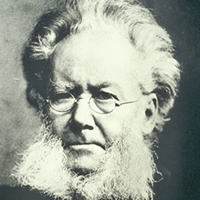A Doll's House as A Feminist Play
The main subject or issue on which the drama A Doll's House is written is the issue of women. More specifically, its subject is of women's status in the society and their treatment by men, the lack of true love and respect for a wife by a husband, and the lack of justice and dignity in the treatment of women in the society itself.

Henrik Ibsen (1828-1906)
A Doll's House is a blooming field for feminist criticism. Feminist critics have seen Ibsen as a social realist, a, revolutionary thinker, and a benefactor of the suppressed, repressed and oppressed women of the nineteenth century Norway and Europe. Indeed, the play concerns a woman's right to individual freedom and the ways in which marriage, especially marriage in stiflingly conventional provincial Norwegian society frustrates and thwarts the individuality of a woman who has all the potentials that her husband has. Nora, like most women of our contemporary society, has all the inherent talents for developing into a successful member of the society, as much as her husband or any man. In fact, her critical mind, sense of justice, readiness to change, absence of hypocrisy and narrow-mindedness in relation to what is called tradition, and such other positive qualities would help her to make more progress and contribute to the development of her personality, her family and her society: if she is to get the opportunities and regard of her silly husband.
In any discussion of A Doll's House as a feminist play, or simply as a play about women, it is necessary to rethink. Is it only about women? When asked about his intention in the play A Doll's House, Ibsen claimed that the play was not a 'feminist' play; he said that it was a 'humanist' play. What Ibsen meant was that the theme of this play was the need of every individual, whether man or woman, to find out the kind of person he or she really is and to strive to become that person. Ibsen meant that it was not about women only: his suggestion was that it is about justice to humanity in general. It means that we look at the problem from a higher parlance of human concern. He saw that an injustice was done to women, and he wrote about it. And this is to say that the play is about injustice first and then about women. It could be about injustice upon old men or children or the poor people. The play’s concern is more humanitarian than feminist. Ibsen was more humanist, than feminist; indeed, he saw no reason why one should be 'feminist' (or man-ist for that matter) when he is already humanist.
However, Ibsen's refusal to limit the play's meaning to being 'feminist' does not change the emotional and psychological effect of the play on the audiences and the readers. It is a woman's predicament with which the play deals; it is the disillusionment of a wife that is the subject of the play; it is the drastic step taken by a-wife with which the play ends; it is the woman in the play who wins our maximum sympathy. Whatever may have been Ibsen's intentions, the effect of the play is to arouse in us a great deal of sympathy for the cause of women
In short, the play seeks to expose the injustice upon women, which was inherent in the culture and attitude of the male-dominated society of the late nineteenth century Norway. It is basically a demand for justice, and whether we call it justice to humanity or justice to women, it is firstly and specifically justice to women indirectly, justice to humanity.
Most modem readers like to call A Doll's House, a feminist play (or at least a play about women's right and dignity) because of many reasons. This is not to say that Ibsen was an "arrant" feminist, nor to say that the play is only about women. But it is about women, or in that neutral sense, a feminist play, because it deals primarily with the desire of a woman to establish her identity and dignity in the society. It is about the disillusionment of a wife about how she has been dominated and how her basic right, her right to be someone, has been ruthlessly destroyed in the name of love by her husband. The drama is about the real and a burning social issue of a revolution that had become essential for the society to progress. Not a small matter, the very title of the play is about the woman in it, and that title also emphatically suggests the treatment of her as if she was a lifeless doll. She has a house and now needs to search for a home, on her own.
A Doll's House Study Center
Signification of the Slamming of the Door in A Doll's House
Nora's Identity as a Person in A Doll's House
Parallelism and Contrast in A Doll's House
The Plot Construction in A Doll's House
A Doll's House Study Center
Introduction of A Doll's House
Detailed Summary of A Doll's House
Dramatic Irony in A Doll's House
Characterization of Mrs. Nora Helmer
A Doll's House as a Reformist Play
A Doll's House as a Modern Tragedy
 |
bachelorandmaster.com |